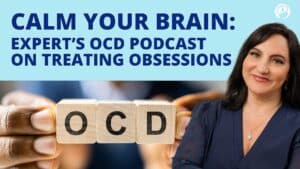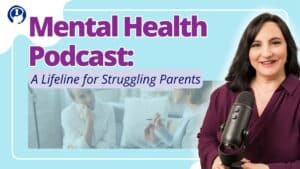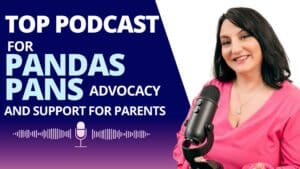Self-regulation and ADHD
Emotional dysregulation and Attention Deficit Hyperactivity Disorder can sometimes feel like a rollercoaster ride. Empowering children and teens to master self-regulation is the key. To do this, parents should understand their kid's challenges to help them gain greater control over their emotions.
The Crucial Role of Self-Regulation in Managing ADHD
Learning self-regulation skills can be likened to acquiring a superpower when managing ADHD symptoms. This powerful tool helps children stay focused, control their impulses, and navigate emotional highs and lows with the poise of seasoned champions. Self-regulation empowers them to rise above the challenges of ADHD.
A Closer Look at Emotional Dysregulation
Emotional dysregulation refers to the difficulty in effectively managing the intensity, duration, and recovery of one's emotional responses to various stimuli, particularly those associated with negative emotions such as criticism, rejection, fear, shame, sadness, or anger.
Even minor challenges can trigger a strong reaction in children and adolescents facing emotional dysregulation, requiring significant parental guidance and support to regain emotional stability.
It can significantly affect the child's ability to cope with everyday frustrations and intense emotions. As a result, parents of children prone to emotional dysregulation often express the need to be cautious and tiptoe around potential triggers to prevent prolonged emotional meltdowns.
What is ADHD?
ADHD is more than just struggling with attention. Children with ADHD display various symptoms, including hyperactivity, impulsivity, and difficulty sustaining focus and attention. In addition, they often struggle with executive functioning skills and face challenges in their daily performance.
Emotional problems are common in kids and adults with ADHD, and they can cause a lot of difficulties in their lives. Recent research by Christiansen et al. (2019) shows that the amygdala, which is involved in emotional reactions, may be more active in people with ADHD; while the orbitofrontal cortex, which helps evaluate emotions, doesn't work as well.
There are also differences in how their body responds to emotions, like changes in heart rate. The issues with these brain structures suggest significant problems with emotion regulation in ADHD.
Understanding Self-Regulation and ADHD
Self-regulation isn't just about controlling one's actions and feelings. It also encompasses your ability to understand, manage, and navigate emotions and impulses. When kids with ADHD self-regulate, they can make positive choices, focus their attention, and handle tricky situations.
However, ADHD can magnify emotions and impulses, making it difficult for kids to stay in control, so they struggle to focus. They need support in managing their energy levels and impulses.
Self-regulation includes two critical processes: self-monitoring and adaptive control. Self-monitoring means being aware of your actions and noticing when you make mistakes. Adaptive control is about changing your behavior and improving after making a mistake. For individuals with ADHD, these processes can be challenging, and it can take more effort for them to correct their errors and adjust their behavior (Shiels & Hawk, 2010).
7 Signs of Emotional Dysregulation in Children with ADHD
Emotional dysregulation goes hand in hand with several ADHD symptoms, particularly when it comes to difficulties with attention, impulsivity, and hyperactivity. Here are more signs to watch out for.
1. Intense Emotions
Kids with ADHD and emotional dysregulation often experience sudden outbursts of anger, frustration, or even sadness that seem to come out of nowhere.
2. Emotional Impulsivity
These kids also tend to act before thinking. They blurt out their thoughts, make hasty decisions, or act without considering the consequences.
3. Difficulty with Self-Control
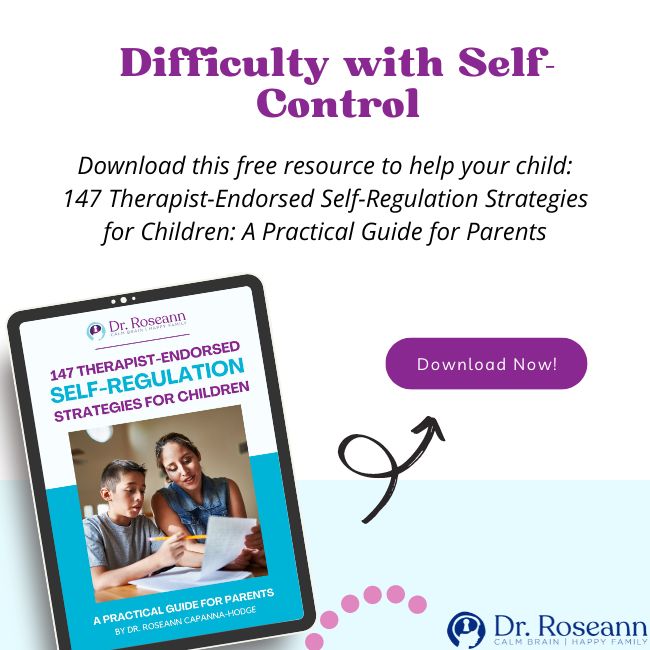
As kids with ADHD struggle with self-control, they'll find it challenging to manage their impulses and regulate their behavior. It’s difficult for them to wait for their turn or follow the rules, which may cause conflict with other kids.
4. Trouble with Transitioning
For children with emotional dysregulation and ADHD, switching from one activity to another is tough. Abrupt transitions may lead to resistance, meltdowns, or aversion to change.
5. Frequent Tantrums
Emotional dysregulation causes kids to express their strong emotions through severe tantrums. These emotional outbursts may involve crying, screaming, or even throwing things. It's their way of letting those big feelings burst out.
6. Difficulty Managing Frustration
Children with this behavior, attention issues, and emotional challenges exhibit low frustration tolerance. As such, they become easily overwhelmed. They feel like the world is against them. It can be challenging for them to cope with setbacks or obstacles, leading to anger and helplessness.
7. Emotional Sensitivity
Kids with both conditions tend to feel everything deeply. As a result, they are more sensitive to criticism, rejection, or even small environmental changes.
Emotional dysregulation can manifest in different situations for children with ADHD. It may be triggered by something as simple as failing to complete a task or not getting what they want. Then, because they find it challenging to manage their frustrations, they revert to impulsive behavior and meltdown.
Such is the case with Lily, a 10-year-old child with an ADHD diagnosis. She loves to play soccer but struggles with emotional control when she misses a goal or loses a game. She throws her water bottle or kicks the ball out of frustration, which sometimes causes arguments with her teammates.
Lily showed many other signs, and thankfully, after some time, her parents recognized that she needed help and support in managing her emotions. Developing an effective strategy to improve Lily’s emotional regulation skills early on is crucial.
The Crucial Role of Early Identification and Intervention
Early identification means initiating treatments sooner and providing strategies and tools to make a difference. With targeted interventions, parents can help their kids manage their emotions, build resilience, and develop the skills to succeed in school and life.
Parents should proactively advocate for their kids, possibly through an IEP or 504 plan, to ensure they receive the care and intervention they deserve.
7 Proven Strategies to Foster Self-Regulation
Self-regulation is essential to help children manage their emotions and behaviors effectively. Here are some practical steps for parents to promote emotional self-control and empower their children to navigate life's challenges.
1. Establish a Structured Routine
A consistent daily routine offers numerous benefits for children with ADHD and emotional regulation issues. Establishing regularity and structure helps them feel more organized. It also reduces the risk of developing anxiety disorders and promotes better focus and productivity throughout the day.
Moreover, routines provide a sense of predictability and control, making it easier for children to manage their time, complete tasks, and engage in positive behaviors. Doing this will lead to improved self-regulation and overall well-being.
2. Teach Kids How to Recognize Their Emotions
Helping children identify and understand their emotions is crucial for their well-being and self-regulation. Children can become more aware of their emotional state and gain valuable insights into their reactions and behaviors by recognizing and labeling their feelings.
Such understanding empowers them to communicate their needs and cope with challenges effectively. It will also encourage them to make healthier choices while fostering emotional intelligence and building a solid foundation for managing their emotions.
3. Implement Strategies to Manage Their Behavior
Behavior management techniques, like positive reinforcement and reward systems, can support self-regulation for children with ADHD (Maclean-Blevins & Muilenburg, 2013). By using praise, rewards, and incentives, parents can motivate and encourage positive behaviors and teach children the value of self-control and self-discipline.
These techniques provide a structured and positive environment where children can learn and practice self-regulation skills. It reinforces desired behaviors and helps them develop a sense of accomplishment and confidence in controlling their impulses.
4. Promote a Healthy Lifestyle
The connection between physical health and emotional regulation is undeniable. When children are well-nourished, well-rested, and engaged in regular physical activity, their bodies and minds are better equipped to handle stress. Exercise releases endorphins, which boost mood and reduce anxiety. Additionally, a balanced diet provides essential nutrients that support brain functions.
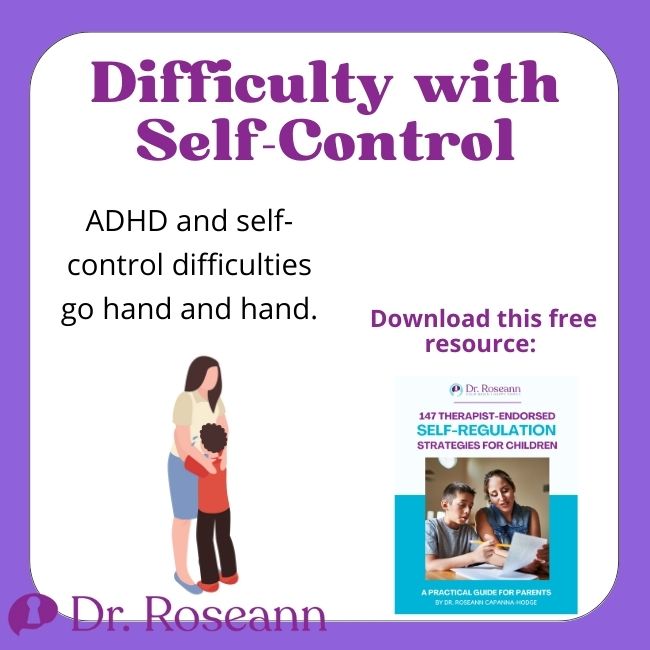
Need more help for your dysregulated child? I'm thrilled to share a must-have, straightforward tool for parents and teachers: “147 Therapist-Endorsed Self-Regulation Strategies for Children: A Practical Guide for Parents.“ This free comprehensive guide encapsulates the strategies we utilize in our personalized BrainBehaviorReset™ Program.
Understanding that managing a child with self-regulation difficulties can be quite demanding, I've designed this guide to offer practical, easy-to-implement strategies. This tool is all about action – providing you with the means to make a real, tangible difference in your child's life.
Take advantage of this free, invaluable resource today. Empower yourself with the expertise from therapist-endorsed strategies and assist your child in skillfully navigating their emotional landscape.
5. Introduce Mindfulness and Relaxation Techniques
Mindfulness practices, such as deep breathing, offer a clinically proven way to enhance self-regulation skills in children. Focusing on the present moment helps them better understand their thoughts, emotions, and bodily sensations.
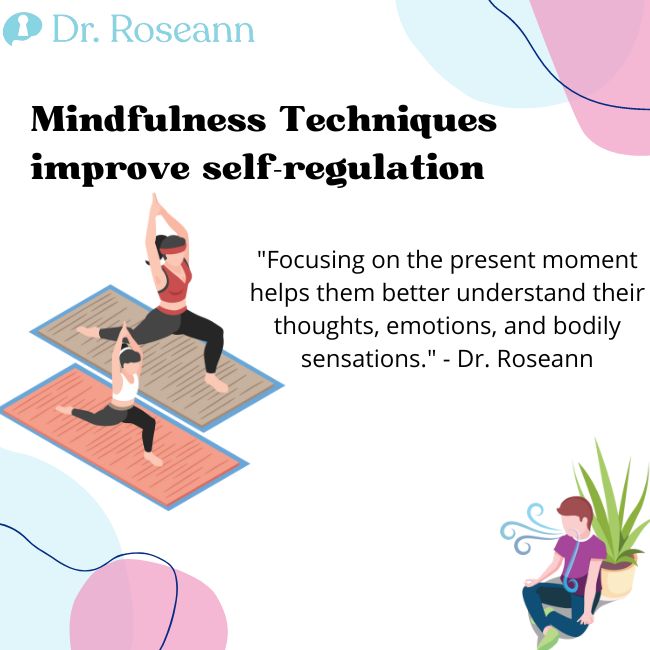
This increased self-awareness empowers children to understand why they feel a certain way. It also reduces impulsivity and allows them to make thoughtful choices. Incorporating mindfulness into daily routines can contribute to their emotional balance.
6. Encourage Resilience
Resilience is crucial in helping these children navigate their daily challenges. It enables them to recover from setbacks, adapt to changes, and maintain a positive outlook. Building resilience also empowers children to develop coping strategies. It helps them persevere through difficulties and embrace their strengths. Doing so ultimately leads to tremendous success in alleviating their symptoms and achieving their goals.
7. Celebrate Progress
It's important to celebrate every small step forward that your child takes in managing their ADHD and deficient emotional self-regulation. Recognize their small efforts, and let them know you're proud of their progress.
Encourage your kids to embrace challenges to foster resilience. Teach them problem-solving skills and instill in them a positive mindset. Provide a nurturing and supportive environment where they feel safe to take risks and learn from mistakes. Celebrating accomplishments and building resilience empowers your child to overcome obstacles and thrive.
The Journey Towards Emotional Balance: You're Not Alone
As parents supporting children with ADHD and emotional self-regulation difficulties, remember you are not alone in this journey. There are natural solutions that can ultimately help with emotional dysregulation.
You may start by addressing ADHD through cognitive-behavioral therapy, neurofeedback, PEMF, and nutrition supplementation. Then, like Lily, whose behavior turned positive when her parents explored natural solutions to manage ADHD and support self-regulation, your child can be happier and do better in school.
Our BrainBehaviorResetTM Program is a multifaceted approach to calming the brain and body without stimulant medication. Lily and her parents benefited from it, and now with the methods we use, including magnesium and other supplements for ADHD, Lily is a thriving adult.
We combine the best science-backed natural solutions in the program to help families across the globe. We work in-person and remotely to provide personalized care for your child and help them achieve lifelong mental wellness.
Parent Action Steps:
☐ Create Routine and Predictable Structure
☐ Promote Emotional Awareness
☐ Reinforce Positive Behavior
☐ Prioritize Healthy Lifestyle
☐ Introduce Mindfulness
☐ Foster Resilience and Coping Skills
☐ Celebrate Steps Toward Progress
☐ Download: 147 Therapist-Endorsed Self-Regulation Strategies for Children: A Practical Guide for Parents
☐ Take our Solution Matcher to get science-backed solutions to help your child today.
Citations
Christiansen, H., Hirsch, O., Albrecht, B., & Chavanon, M.-L. (2019). Attention-Deficit/Hyperactivity Disorder (ADHD) and Emotion Regulation Over the Life Span. Current Psychiatry Reports, 21(3). https://doi.org/10.1007/s11920-019-1003-6
Maclean-Blevins, A., & Muilenburg, L. (2013, June 24). Using Class Dojo to Support Student Self-regulation. Www.learntechlib.org; Association for the Advancement of Computing in Education (AACE). https://www.learntechlib.org/p/112192/
Shiels, K., & Hawk, L. W. (2010). Self-regulation in ADHD: The role of error processing. Clinical Psychology Review, 30(8), 951–961. https://doi.org/10.1016/j.cpr.2010.06.010
Always remember… “Calm Brain, Happy Family™”
Are you looking for SOLUTIONS for your struggling child or teen?
Dr. Roseann and her team are all about solutions, so you are in the right place!
There are 3 ways to work with Dr. Roseann:
You can get her books for parents and professionals, including: It’s Gonna Be OK™: Proven Ways to Improve Your Child’s Mental Health, Teletherapy Toolkit™ and Brain Under Attack: A Resource For Parents and Caregivers of Children With PANS, PANDAS, and Autoimmune Encephalopathy.
If you are a business or organization that needs proactive guidance to support employee mental health or an organization looking for a brand representative, check out Dr. Roseann’s media page and professional speaking page to see how we can work together.
Dr. Roseann is a Children’s Mental Health Expert and Licensed Therapist who has been featured in/on hundreds of media outlets including The Mel Robbins Show, CBS, NBC, PIX11 NYC, Today, FORBES, CNN, The New York Times, The Washington Post, Business Insider, Women’s Day, Healthline, CNET, Parade Magazine and PARENTS. FORBES called her, “A thought leader in children’s mental health.”

She coined the terms, “Re-entry panic syndrome” and “eco-anxiety” and is a frequent contributor to media on mental health.
Dr. Roseann Capanna-Hodge has three decades of experience in working with children, teens and their families with attention-deficit hyperactivity disorder (ADHD), autism, concussion, dyslexia and learning disability, anxiety, Obsessive Compulsive Disorder (OCD), depression and mood disorder, Lyme Disease, and PANS/PANDAS using science-backed natural mental health solutions such as supplements, magnesium, nutrition, QEEG Brain maps, neurofeedback, PEMF, psychotherapy and other non-medication approaches.
She is the author of three bestselling books, It’s Gonna Be OK!: Proven Ways to Improve Your Child's Mental Health, The Teletherapy Toolkit, and Brain Under Attack. Dr. Roseann is known for offering a message of hope through science-endorsed methods that promote a calm brain.
Her trademarked BrainBehaviorResetⓇ Program and It’s Gonna be OK!Ⓡ Podcast has been a cornerstone for thousands of parents facing mental health, behavioral or neurodevelopmental challenges.
She is the founder and director of The Global Institute of Children’s Mental Health, Neurotastic™Brain Formulas and Dr. Roseann Capanna-Hodge, LLC. Dr. Roseann is a Board Certified Neurofeedback (BCN) Practitioner, a Board Member of the Northeast Region Biofeedback Society (NRBS), Certified Integrative Mental Health Professional (CIMHP) and an Amen Clinic Certified Brain Health Coach. She is also a member of The International Lyme Disease and Associated Disease Society (ILADS), The American Psychological Association (APA), Anxiety and Depression Association of America (ADAA) National Association of School Psychologists (NASP), International OCD Foundation (IOCDF).
© Roseann-Capanna-Hodge, LLC 2023
Disclaimer: This article is not intended to give health advice and it is recommended to consult with a physician before beginning any new wellness regime. *The effectiveness of diagnosis and treatment vary by patient and condition. Dr. Roseann Capanna-Hodge, LLC does not guarantee certain results.






